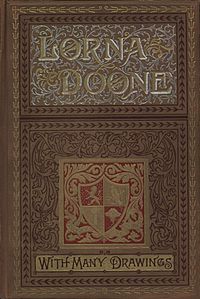Lorna Doone

1893 edition
|
|
| Author | R. D. Blackmore |
|---|---|
| Country | United Kingdom |
| Language | English |
| Published | 1869 Sampson Low, Son, & Marston |
Lorna Doone: A Romance of Exmoor is a novel by English author Richard Doddridge Blackmore, published in 1869. It is a romance based on a group of historical characters and set in the late 17th century in Devon and Somerset, particularly around the East Lyn Valley area of Exmoor. In 2003, the novel was listed on the BBC's survey The Big Read.
Blackmore experienced difficulty in finding a publisher, and the novel was first published anonymously in 1869, in a limited three-volume edition of just 500 copies, of which only 300 sold. The following year it was republished in an inexpensive one-volume edition and became a huge critical and financial success. It has never been out of print.
It received acclaim from Blackmore's contemporary, Margaret Oliphant, and as well from later Victorian writers including Robert Louis Stevenson, Gerard Manley Hopkins, and Thomas Hardy. A favourite among female readers, it is also popular among males, and was chosen by male students at Yale in 1906 as their favourite novel.
By his own account, Blackmore relied on a "phonologic" style for his characters' speech, emphasising their accents and word formation. He expended great effort, in all of his novels, on his characters' dialogues and dialects, striving to recount realistically not only the ways, but also the tones and accents, in which thoughts and utterances were formed by the various sorts of people who lived in the Exmoor district in the 17th century.
Blackmore incorporated real events and places into the novel. The Great Winter described in chapters 41–45 was a real event. He himself attended Blundell's School in Tiverton which serves as the setting for the opening chapters. One of the inspirations behind the plot is said to be the shooting of a young woman at a church in Chagford, Devon, in the 17th century. Unlike the heroine of the novel, she did not survive, but is commemorated in the church. Apparently, Blackmore invented the name "Lorna", possibly drawing on a Scottish source.
...
Wikipedia
